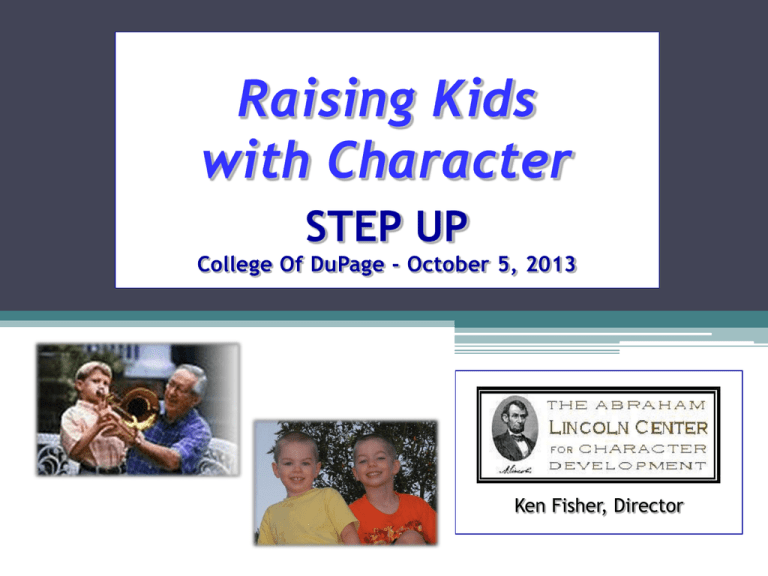here - Lincoln Center for Character Development
advertisement

Raising Kids with Character STEP UP College Of DuPage - October 5, 2013 Ken Fisher, Director We often parent the way we were parented (or not). • How are you doing with parenting? • How do you know? • What are the measures? Raising Kids with Character The Abraham Lincoln Center for Character Development Why is Abraham Lincoln so revered? Though defeated in many elections, he became the 4 16th U.S. President (and re-elected during the Civil War) Gettysburg Address – November 19, 1863 Re-united the Nation – ending the Civil War Helped pass the 13th Amendment – freed the slaves Established the Secret Service – April 14, 1865 Treasury Dept. – counterfeit money (it would take another 36 years and the assassination of two more Presidents - Garfield and McKinley - before Congress added protection of the President to its duties). The Abraham Lincoln Center for Character Development Abraham Lincoln signed: Homestead Act - May 20, 1862 Opened western lands for homesteading Pacific Railway Act - July 1, 1862 Established a Transcontinental Railroad Morrill Act - July 2, 1862 Established land-grant colleges that eventually became the nation's A & M universities such as University of Illinois Emancipation Proclamation – Sept. 22, 1862 Executive Order that freed slaves in 10 states 5 The Abraham Lincoln Center for Character Development Why Abraham Lincoln and parenting? 1. What was his family life like growing up? 2. How was his relationship with his father? 3. How many children did he have? 4. How would you rate him as a parent? 6 The Abraham Lincoln Center for Character Development Why is Abraham Lincoln so important? Because of what he DID (his accomplishments)? or Because of who he WAS (his character)? 7 The Abraham Lincoln Center for Character Development Why is Abraham Lincoln important today? As a great model of character: Honesty Integrity Perseverance/Diligence/Fortitude Respect Duty/Responsibility Justice/fairness Lincoln’s Virtues Compassion/Empathy Courage (moral not physical) Pragmatism/principled realism Prudence/Wisdom 8 Raising Kids with Character AGENDA 9 Welcome, Introduction, Lincoln Challenges Facing Parents Purpose: Inspiration & Information (Encouragement & Resources) (Ideas & Tools) What is Character? Tools for Building Character Resources for Moving Forward Raising Kids with Character Raising Kids with Character If you could wave a magic wand so that the person your child marries has one of the following qualities, which would you chose? 11 Enormous wealth Fabulous good looks Superb athletic ability Great fame Good character Raising Kids with Character Why so Challenging? Which of these have the most influence on our Youth? - Dr. Hal Urban 30+ Year teacher National Character Education Speaker Author of Life’s Greatest Lessons, Positive Words, Powerful Results & Choices That Change Lives 12 Past – Today • Faith • Home • Media • Peers • School Raising Kids with Character Why so Challenging? Recent Past: 1. Home 2. School 3. Faith 4. Peers 5. Media 13 Today: 1. Media 2. Peers 3. Home 4. School 5. Faith Raising Kids with Character How are we doing with Character? Better? Worse? About the same? 14 How to Build Character Character development is most effective when it begins at home... is reinforced at school... and supported throughout the Community. 15 SM It takes a T.E.A.M. approach… TEACH – children that their character counts and that people of character do what is right. ENFORCE – Reward good behavior while discouraging negative instances with fair and consistent consequences to prove we are serious about character. ADVOCATE – Make sure we are not neutral about the importance of good character. MODEL – Be careful and self-conscious about setting a good example in what you say and do. 16 Raising Kids with Character 17 Raising Kids with Character Character is power. — Booker T. Washington 18 Smart & Good High Schools: Integrating Excellence & Ethics for Success in School, Work, and Beyond by Dr. Tom Lickona & Dr. Matt Davidson Major support provided by: John Templeton Foundation 19 Culture of Excellence & Ethics™ Professional Development Toolkits Providing the knowledge & tools needed for building a culture of excellence and ethics. © 2011 Institute for Excellence & Ethics, Inc (IEE) The Institute for Excellence & Ethics, is a 501 (c)(3) non-profit 20 Raising Kids with Character The ability to do our best work. 21 The ability to have positive, productive, and ethical relationships. Performance Character A Mastery Orientation • The values needed to do our best, including: effort, self-discipline, goalsetting, perseverance, a strong work ethic, a positive attitude, creativity, and organization. 22 Raising Kids with Character “Every man's work, whether it be literature or music or pictures or architecture or anything else, is always a portrait of himself.” - Samuel Butler (1835-1902) British writer “We are what we repeatedly do. Excellence, then, is not an act but a habit.” - Aristotle Moral Character A Relational Orientation • The values needed for successful relationships and ethical behavior, including: fairness, caring, loyalty, honesty, respect, integrity, and humility. • Moral character ensures that we pursue “victory with honor.” 24 Character = Values in Action Assertiveness Curiosity Initiative Effort Diligence Leadership Courage Confidence Enthusiasm Loyalty Sport Imagination Empathy Forgiveness Acting Kindness Respect Resourcefulness Determination Grit 25 Civility Wisdom Resilience Endurance Accountability Integrity Service Citizenship Bravery Honor Gratitude Justice Love Responsibility Creativity Entrepreneurial Patience Friendship Self-Discipline Energy Self-Control Cooperation Positive Attitude Faith Prudence Generosity Perseverance Work Ethic Commitment Ambition Drive Courtesy Caring Honesty Humility Peace Compassion Trust Mercy There’s a difference between: • Performance = the outcome (the grade, the honor or award, the achievement). • Performance character = those qualities needed to pursue our personal best—whether the outcome is realized or not. • Talent = the natural ability we are born with (intellectually, artistically, physically, etc.). • Character development = the process by which we develop the dispositions NEEDED FOR maximizing our talent potential. 26 26 Raising Kids with Character 27 Raising Kids with Character Talent is Overrated "Sports do not build character. They reveal it." - Heywood Hale Broun, American sportswriter “Ability is what you are capable of doing. Motivation determines what you do. Attitude determines how well you do it. ” - "Lou" Holtz, football coach "Winning doesn't always mean being first. Winning means you're doing better than you've ever done before.” - Bonnie Blair speed skating gold medalist Raising Kids with Character Talent is Overrated Recent research and publications: • • • • • Talent is Overrated (2010), Geoff Calvin Mindset (2006), Carol Dweck Drive (2009), Daniel Pink Outliers (2008), Malcolm Gladwell Handbook of Expertise and Expert Performance (2006), Anders Erickson • Character Strengths and Virtues (2004), Christopher Peterson & Martin Seligman • Grit (2007), Angela Duckworth • How Children Succeed (2011), Paul Tough Raising Kids with Character Taken together, we must have both: Do our best work. 30 Treat each other with respect and care. Raising Kids with Character We shape the culture, The culture shapes character. 31 Raising Kids with Character 32 Raising Kids with Character Tool: A faster way to do a job more consistently. Raising Kids with Character Different job, different tools. Still a faster way to do a job more consistently. Raising Kids with Character 2 Power2Achieve Tools: Attitude/ Effort Rubric 35 Integrity in Action Checklist Raising Kids with Character 36 Raising Kids with Character How comfortable would you be? “Lead your life so you wouldn’t be ashamed to sell the family parrot to the town gossip.” - Will Rogers Raising Kids with Character 40 Raising Kids with Character Raising Kids with Character 43 Raising Kids with Character Create Families of Character - Dr. Tom Lickona, The Center for the 4th & 5th Rs - Raising Good Kids 44 1. 2. 3. 4. 5. 6. 7. 8. 9. 10. 11. Make character development a high priority Be an authoritative parent Love children Teach by example Manage the moral environment Use direct teaching to form conscience & habits Teach good judgment Discipline wisely Solve conflicts fairly Provide opportunities to practice virtues Foster spiritual development Chapt. 2; 2004 Raising Kids with Character Building Moral Intelligence - Michelle Borba, Ed.D. Moral Intelligence = the capacity to tell right from wrong; to have strong ethical convictions and to act on them in a right and honorable way. Consists of 7 essential virtues: 45 1. 2. 3. 4. 5. 6. 7. Empathy Conscience Self-control Respect Kindness Tolerance Fairness The Moral Core Raising Kids with Character How Children Succeed - Paul Tough Developing certain character strengths is the most powerful tool in producing happy and well-adjusted kids. 1. 2. 3. 4. 5. 6. 7. 46 grit self-control zest social intelligence gratitude optimism curiosity Raising Kids with Character How to Raise a Drug-Free Kid - James A. Califano Jr. former HEW Secr. The Nine Facets of Parental Engagement 47 1. 2. 3. 4. 5. 6. 7. 8. 9. Be there: Get involved in lives and activities Open the lines of communication – wide open Set a good example: Actions more than words Set the rules and your child to follow them Monitor your child’s whereabouts Maintain family rituals, such as dinner together Incorporate religious and spiritual practices Get Dad engaged – and keep him engaged Engage with the larger community Raising Kids with Character 48 Raising Kids with Character “Parents often talk about the younger generation as if they didn’t have anything to do with it.” — Dr. Haim Ginott Between Parent and Child 49 Raising Kids with Character “Adversity does not build character, it reveals it.” - James Lane Allen (1849-1923); novelist My father said there are two kinds of people in the world: givers and takers. The takers may eat better, but the givers sleep better. - Marlo Thomas; actress Raising Kids with Character "Character may be manifested in the great moments, but it is made in the small ones.” - Phillips Brooks “The truth is that parents are not really interested in justice. They just want quiet.” — Bill Cosby "Nothing is more important for the public welfare than to form and train our youth in wisdom and virtue.” -- Benjamin Franklin 51 Raising Kids with Character In the Workplace? "By themselves, character and integrity do not accomplish anything. But their absence faults everything else.” - Peter Drucker "In looking for people to hire, look for three qualities: integrity, intelligence and energy. And if they don’t have the first, the other two will kill you." - Warren Buffett Raising Kids with Character Character Development Reminder You don’t have to be sick to get better. - Michael Josephson 53 Raising Kids with Character Character Development Reminder “I’m not what I ought to be, Not what I am going to be, But I am thankful that I am better than I used to be.” — John Wooden UCLA Teacher/Coach 54 Character development is a life-long process – for ALL of us Raising Kids with Character Character Development Reminder It takes a T.E.A.M. approach… • TEACH – to do what is best • ENFORCE – reward good and discourage negative behavior • ADVOCATE – don’t be neutral • MODEL – set a good example 55 © 2000 Josephson Institute Raising Kids with Character Character Development Reminder “Character is like a tree and reputation like its shadow. The shadow is what we think of it; the tree is the real thing.” — Abraham Lincoln 56 The Abraham Lincoln Center for Character Development Why is Abraham Lincoln important today? As a great model of character: Honesty Integrity Perseverance/Diligence/Fortitude Respect Duty/Responsibility Justice/fairness Lincoln’s Virtues Compassion/Empathy Courage (moral not physical) Pragmatism/principled realism Prudence/Wisdom 57 Raising Kids with Character “Every one of us receives and passes on an inheritance. It may not be an accumulation of earthly possessions or acquired riches, but whether we realize it or not, our choices, words, actions and values will impact someone and form the heritage we hand down.” — Ben Hardesty Musician (The Last Bison) 58 What is the legacy you will leave? Kids With Character! STEP UP Raising Kids with Character… is about helping our children learn to be “successful” in life through the power of character (performance and moral) AND using the strength of our own character to consistently put our values into action. Raising Kids with Character Resources Books: Character Matters, Dr. Tom Lickona Building Moral Intelligence, Dr. Michelle Borba How Children Succeed, Paul Tough How to Raise a Drug-Free Kid, James A. Califano, Jr. Websites: www.lincolncharacter.org www.excellenceandethics.com www.charactercounts.org www.character.org Ken Fisher = kfisher@lincolncharacter.org The Abraham Lincoln Center for Character Development For more information: Contact: Ken Fisher, Director (630) 302-2136 (mobile) (720) 381-6711 kfisher@lincolncharacter.org Visit: www.lincolncharacter.org www.excellenceandethics.com www.charactercounts.org www.character.org






